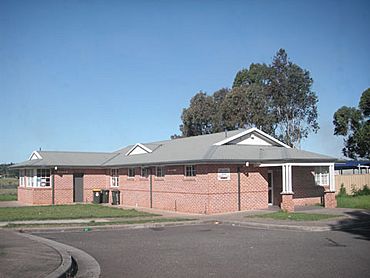Bow Bowing, New South Wales facts for kids
Quick facts for kids Bow BowingSydney, New South Wales |
|||||||||||||||
|---|---|---|---|---|---|---|---|---|---|---|---|---|---|---|---|

Bow Bowing Neighbourhood Centre
|
|||||||||||||||
| Population | 1,606 (2021 census) | ||||||||||||||
| Established | 1976 | ||||||||||||||
| Postcode(s) | 2566 | ||||||||||||||
| Elevation | 42 m (138 ft) | ||||||||||||||
| Location | 49 km (30 mi) south-west of Sydney CBD | ||||||||||||||
| LGA(s) | City of Campbelltown | ||||||||||||||
| State electorate(s) | Macquarie Fields | ||||||||||||||
| Federal Division(s) | Werriwa | ||||||||||||||
|
|||||||||||||||
Bow Bowing is a suburb located in Sydney, Australia. It's about 49 kilometres south-west of Sydney's city centre. This suburb is part of the City of Campbelltown area, which is in the Macarthur region.
History of Bow Bowing
The name Bow Bowing comes from a nearby creek. The creek's original name was likely 'Boro Borang,' which was an Aboriginal word. Over time, it changed to Bow Bowing.
Before 1975, the area was known as Saggart's Field. This name came from a local family who lived there for over a hundred years. A school built in 1866 was first called Saggart Field School. Later, in 1884, it became Minto Public School.
In 1976, the Housing Commission bought land in the area. They planned to build over a thousand homes. However, local people had concerns about the large development. Because of these concerns, the original plan was changed.
The land was then sold to private companies. These companies built 350 homes in the area instead. The new housing development was officially opened in 1990.
People of Bow Bowing
According to the 2021 census, there were 1,606 people living in Bow Bowing. Most people, about 59.5%, were born in Australia.
When it comes to languages, 58.5% of people spoke only English at home. Other languages spoken included Arabic, which was spoken by 5.4% of residents.
People in Bow Bowing follow different religions. The most common responses for religion were Catholic (27.1%), No Religion (18.1%), Islam (12.6%), Anglican (9.6%), and Hinduism (8.2%).
 | Delilah Pierce |
 | Gordon Parks |
 | Augusta Savage |
 | Charles Ethan Porter |


